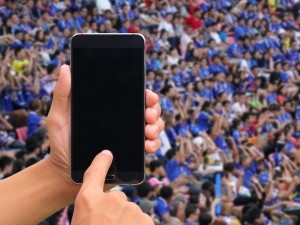
Sports fans across Africa have just watched their national football teams fight it out in the Africa Cup of Nations, whether in the stadium, on their TV screens or - as is increasingly the case with global sporting events - streaming it online.
While die-hard fans would usually argue that there is nothing like the live game experience, consuming sport online does give you access to the data and stats that sports buffs love - and lets you share it with your friends. So imagine how good it would be to combine watching a game live with having access to the Internet at your fingertips.
For sports fans in many countries that pretty much just means watching a game live: a recent study commissioned by Avaya in and conducted in Australia, the UK, and the US suggests that sports fans consider going online is part of their game experience. According to that study, 71% of fans post on social media while attending the game, with a whopping 89% of 18-24 years old creating videos of their own while still in the stadium.
With mobile data traffic expected to grow by 55% a year in Africa in the next six years, and South Africa being home to more mobile phones than people, it's safe to say that we can expect similar levels of interest for online access at sporting venues here.
Unfortunately, stadiums offering WiFi is all but unknown in South Africa, let alone as a free service. This despite the evidence in other markets that shows that stadium owners and teams that provide more personalised digital experiences can increase fan engagement and generate new revenue opportunities.
By failing to accommodate modern customer experiences, venues and clubs are denying themselves free marketing from the masses who engage with sport, consequently limiting the potential audience to which a particular event or game can be presented. All of this hits the bottom line over the short and long term.
The good news is that the technology to drive digital transformation exists and has the ability to deliver virtualised networks and simplify networking generally. The challenge is in helping leaders understand that these new models are industry-standardised, easily-supported and highlighting to them the value of these long-term services investment versus the temporary benefit of immediate capital expenditure savings.
Generally speaking, enterprises are more advanced than the wider sports industry. So, whilst it is critical for sport to be run by sports people, it is also important for venues, governing bodies and clubs to adopt practices from enterprises. This is true at both micro and macro levels, whether it's a national sports competition or a large-scale event - a game of footy or the Olympic Games.
Let's look at the Olympic Games as an example of a large scale event. The influx of tens of thousands of tourist congregating on one city to join millions of local for two weeks of sport is a major challenge for traditional network technologies. Outdated infrastructure is simply incapable of providing the bandwidth for a consistent peak load. It doesn't give organisers the capacity to push out high-value services around the clock at high speed, especially when delivering an app that so many people are accessing simultaneously. However, through a virtualised approach based around software-defined architecture, event organisers can very easily spin up and supply bandwidth right across the event, including fringe venues and attractions that aren't in the main stadiums and arenas, all without compromising performance - that means no dropouts nor lag. Better still, a software-based virtualised network removes maintenance headaches so that any hiccups can be quickly remedied by those organisers.
By transforming the network underpinning the WiFi being provided to all those people - just as venues are uplifted in anticipation for the Games - events operators are in a position to enable the new generation of sports fans which have themselves transformed from viewers to broadcasters, particularly in the 18 to 34-year-old age group which is leading the digital charge. As a result, a venue's biggest online influencers - connected fans - can continue to engage with brands.
For more information, please visit www.avaya.com or e-mail drew2@avaya.com
Share
Editorial contacts